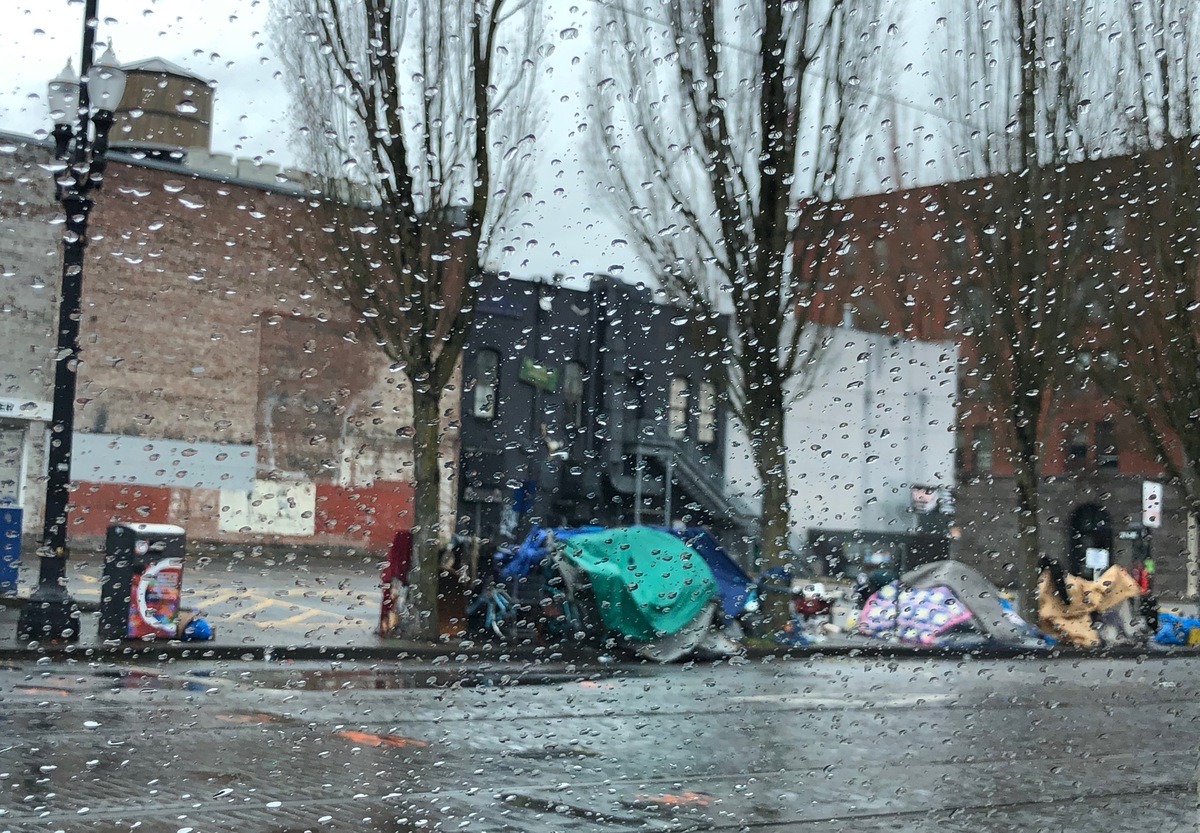
Photograph by Nathaniel St. Clair
A rent moratorium is knocking on Washington’s door. By early April almost 17 million people lost their jobs and 31 percent of renters did not pay. How could they? They have no income. A deadly pandemic has shut down businesses. People are afraid to go to the grocery store because of infection – the grocery store! That is, those who have money for groceries and aren’t lining up at the local food bank.
How are these 17 million supposed to pay rent, when before Covid-19 struck, a high percentage of them had barely $400 for an emergency? The idea that the $1200 from the feds will see them through more than one month’s rent and living is laughable. The unemployed either need a monthly universal basic income or a rent moratorium for the duration of the plague. Otherwise the U.S. will see tens of millions of people booted out on the streets.
A government that can bail out a fatally cost-cutting and incompetent corporation like Boeing – which was headed for bankruptcy before the pestilence, due to its negligent homicide of hundreds in two plane crashes – to the tune of billions of dollars, such a government can bail out its citizens, the innocent victims of an economic collapse they did nothing to cause.
Some states and localities have stepped up. They have instituted rent moratoriums. But these are mostly for a mere month or two, and this patchwork safety net has lots of holes. Some states have only stopped evictions for a few weeks; as of late March, many of these moratoriums ended after April 1. Just recently the New York City mayor called for a pause of rent increases on rent stabilized apartments. While this is helpful, it just doesn’t cut it. People have lost their jobs, can’t afford food and line up for miles at food banks. Rents, not just increases, need to be suspended.
Surprisingly in Florida, where the governor has been otherwise very behind-hand, a 45-day suspension of evictions and foreclosures went into effect on April 2. But California shrank from such a statewide eviction ban. Instead, the governor empowered local governments to do so. Some have, some haven’t. Meanwhile landlords want that $1200 the feds are handing out. But food and medicine come first. Nationally, evictions should be halted. A federal policy is needed.
Along with rent, people can’t pay for water and utilities. Almost 90 cities and states in the U.S. have stopped water shutoffs. The seven states are: Connecticut, Illinois, Louisiana, New Jersey, New York, Pennsylvania and Wisconsin. But few water departments will reconnect those they’ve already shut off; people in those impoverished households will have to find another way to wash their hands. For utilities, suspensions of cutoffs have been ordered in 23 states: California, Colorado, Connecticut, Illinois, Iowa, Kansas, Kentucky, Louisiana, Maine, Maryland, Massachusetts, Mississippi, New Hampshire, New Jersey, New York, North Carolina, Ohio, Pennsylvania, South Carolina, Tennessee, Texas, Virginia and Wisconsin. In other words and not surprisingly, utilities have zoomed ahead of landlords in recognizing their customers’ dire circumstances during a plague-caused lockdown. Or maybe real estate developers just have more clout in statehouses.
Even if the lockdown comes off soon, and some people can return to work in a month, they will still have unaffordable, outstanding bills. If these are not forgiven, it is hard to see how there will be any recovery. Landlords will evict millions, and millions will lose water and electricity. But so far, the Trump administration seems far more concerned with bailing out rich corporations that bet wrong in the stock market, or with bailing out the stock market itself. The message is clear: if you’re not wealthy, expect crumbs from the federal government, namely a one-time payout – two times, if we’re lucky – and an extension of unemployment benefits.
These actions are better than nothing, but the prospect of real help for the tens of millions who need it is not good. Republican senators begrudge a measly $600 unemployment increase, fretting that it will incentivize workers to stay home. These Scrooges have never had to scrimp by on a nearly empty checking account. In fact, several senators dumped stock after a classified briefing on coronavirus, violating a 2012 law. Nothing could make their priorities clearer: their stock portfolios come first, their constituents’ desperate need for food, shelter, water, heat and electricity – a distant last.